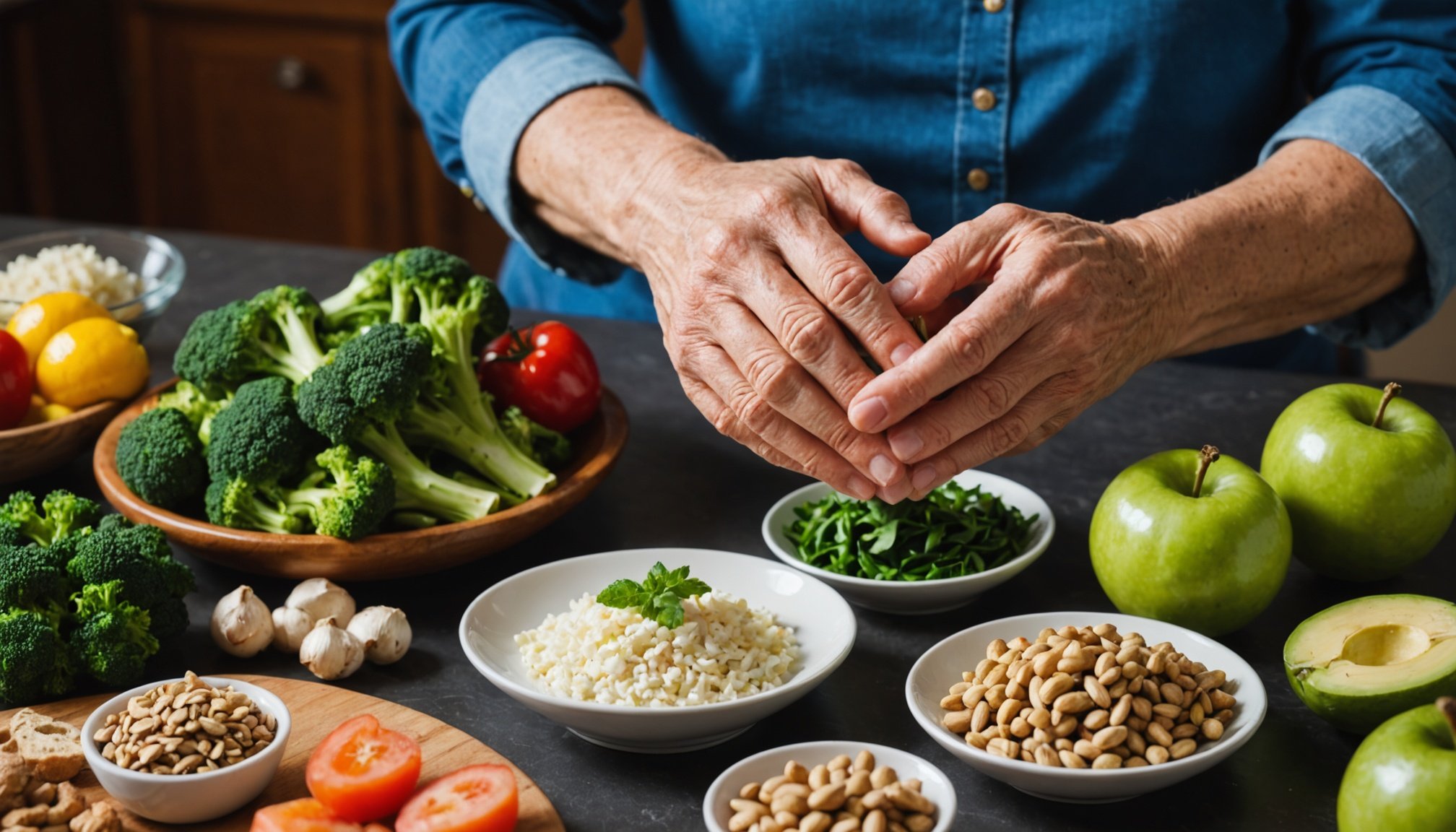Powerful Nutritional Strategies to Alleviate Rheumatoid Arthritis Symptoms
Rheumatoid arthritis (RA) is a chronic autoimmune disease that causes inflammation and pain in the joints, affecting millions of people worldwide. While there is no cure for RA, nutritional strategies can play a significant role in managing its symptoms and improving overall health. Here, we will delve into the most effective dietary approaches to help alleviate the discomfort and inflammation associated with rheumatoid arthritis.
Understanding Rheumatoid Arthritis and Nutrition
Rheumatoid arthritis is characterized by joint inflammation, which can lead to severe pain, swelling, and eventual joint damage. The link between nutrition and RA is complex but increasingly well-understood. Research has shown that certain foods and nutrients can either exacerbate or alleviate the symptoms of this disease.
Also read : The Benefits and Drawbacks of Smart Inhalers for Effective Asthma Care: An In-Depth Look
The Role of Gut Health
Gut health is a critical factor in managing RA. Studies have indicated that there is a strong connection between the gut microbiome and the development of rheumatoid arthritis. A healthy gut microbiome can help reduce inflammation, while an imbalance can exacerbate the disease. For instance, a small study published in Contemporary Clinical Trials found that RA patients who followed a specific diet for two weeks reported a 50% reduction in pain and swelling, highlighting the potential benefits of dietary interventions on gut health[1].
Anti-Inflammatory Foods and Nutrients
Certain foods and nutrients are known for their anti-inflammatory properties, which can be particularly beneficial for people with rheumatoid arthritis.
In the same genre : Unlocking Life-Saving Skills: The Best Approaches to Teach Hands-Only CPR to Everyone
Omega-3 Fatty Acids
Omega-3 fatty acids, particularly EPA and DHA found in oily fish, are renowned for their anti-inflammatory effects. Consuming two portions of fish per week, one of which should be oily (such as sardines, mackerel, or salmon), can help reduce inflammation. If incorporating fish into your diet is challenging, fish-oil supplements can be an alternative, providing a daily dose of 450 mg of EPA and DHA[3].
Mediterranean Diet
The Mediterranean diet, rich in fruits, vegetables, whole grains, and healthy fats like olive oil, has been shown to help reduce inflammation and improve overall health. This diet is characterized by high intake of anti-inflammatory components such as omega-3 fatty acids, antioxidants, and fiber, all of which can help alleviate RA symptoms[5].
Vitamin and Mineral Intake
Vitamins and minerals play a crucial role in maintaining overall health and reducing disease activity. Here are some key vitamins and minerals that can help:
- Vitamin D: Important for bone health and immune function. Individuals with RA often have lower levels of vitamin D, so ensuring adequate intake through sunlight exposure, supplements (10-25 µg/day), or fortified foods is essential[3].
- Vitamin K: Involved in bone and cartilage health. Foods rich in vitamin K include kale, spinach, broccoli, and certain cheeses like Norwegian Jarlsberg and Swiss Emmental[3].
- Antioxidants: Found in fruits and vegetables, antioxidants help reduce oxidative stress and inflammation. A diet rich in fresh fruits and vegetables can significantly benefit people with RA[4].
Foods to Include and Avoid
Understanding which foods to include and avoid can significantly impact the management of RA symptoms.
Foods to Include
- Fatty Fish: As mentioned, oily fish like salmon, mackerel, and sardines are rich in omega-3 fatty acids.
- Fruits and Vegetables: High in antioxidants and vitamins, these foods help reduce inflammation and support overall health.
- Whole Grains: Rich in fiber, whole grains help maintain a healthy gut microbiome.
- Nuts and Seeds: Almonds, walnuts, and chia seeds are good sources of healthy fats and fiber.
- Healthy Oils: Olive oil and rapeseed oil are rich in mono-unsaturated fats, which can help reduce inflammation.
Foods to Avoid
- Processed Foods: High in unhealthy fats, sugars, and preservatives, these foods can exacerbate inflammation.
- Red Meat: Consuming high amounts of red meat has been linked to increased inflammation and disease activity.
- Dairy Products: While there is no conclusive evidence that dairy products worsen RA symptoms for everyone, some people may find that avoiding dairy helps reduce their symptoms[3].
Practical Dietary Tips
Here are some practical tips to help you incorporate these nutritional strategies into your daily life:
Create a Balanced Diet
- Increase Fiber Intake: Aim for a diverse range of fruits, vegetables, beans, pulses, nuts, seeds, and whole grains to improve gut health and reduce inflammation.
- Replace Saturated Fats: Switch from saturated fats to unsaturated fats by choosing healthier oils like olive oil and rapeseed oil.
- Include Anti-Inflammatory Foods: Make sure to include foods rich in omega-3 fatty acids, antioxidants, and vitamins in your diet.
Sample Meal Plan
Here is a sample meal plan to help you get started:
| Meal | Food Choices |
|---|---|
| Breakfast | Oatmeal with nuts and fruits, or scrambled eggs with spinach and whole-grain toast |
| Lunch | Grilled salmon with quinoa and mixed vegetables, or a salad with olive oil dressing |
| Dinner | Stir-fry with vegetables, lean protein, and brown rice, or lentil soup with whole-grain bread |
| Snacks | Fresh fruits, carrot sticks with hummus, or a handful of almonds |
Lifestyle Changes
In addition to dietary changes, regular exercise and maintaining a healthy weight can significantly help reduce RA symptoms.
- Exercise Regularly: Aim for at least 30 minutes of moderate exercise per day to preserve muscle strength and joint mobility.
- Maintain a Healthy Weight: Excess weight can put additional strain on the joints, so achieving and maintaining a healthy weight through a balanced diet and regular exercise is crucial.
Real-Life Examples and Anecdotes
Many people with RA have found significant relief through dietary changes. For example, a study mentioned that RA patients who followed a specific diet for two weeks reported a 50% reduction in pain and swelling. Here’s what one patient had to say:
“After incorporating more omega-3 rich foods and reducing my intake of processed foods, I noticed a significant reduction in my joint pain. It’s not a cure, but it definitely makes managing my RA easier.”
Managing rheumatoid arthritis through nutritional strategies is a powerful approach that can help alleviate symptoms, reduce inflammation, and improve overall health. By focusing on anti-inflammatory foods, maintaining a balanced diet, and avoiding harmful foods, individuals with RA can take significant steps towards better health.
Key Takeaways
- Include Anti-Inflammatory Foods: Omega-3 fatty acids, antioxidants, and vitamins are crucial in reducing inflammation.
- Maintain a Balanced Diet: Focus on whole grains, fruits, vegetables, and healthy fats.
- Avoid Processed and High-Saturated Foods: These foods can exacerbate inflammation and worsen RA symptoms.
- Stay Active and Maintain a Healthy Weight: Regular exercise and a healthy weight can help reduce joint strain and improve overall health.
By adopting these nutritional strategies, people with rheumatoid arthritis can better manage their symptoms and improve their quality of life. Remember, while diet alone cannot cure RA, it is a vital component of a comprehensive management plan.











